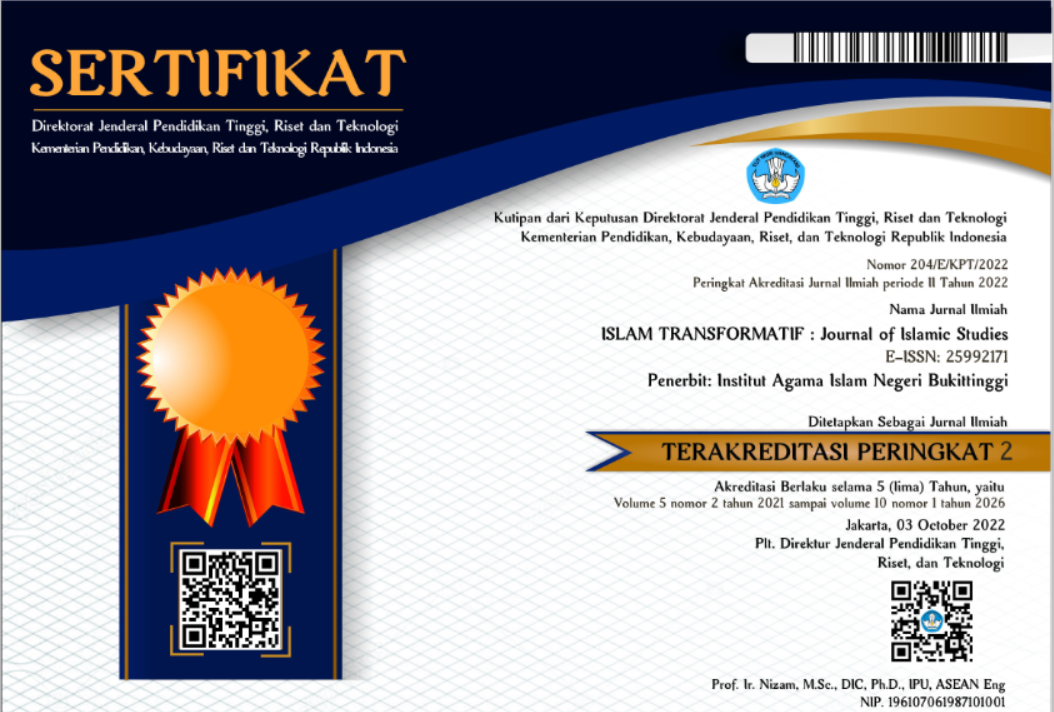URGENSI KAJIAN NASIKH DAN MANSUKH DALAM BINGKAI GENERASI KEKINIAN (Upaya Membumikan Teori Klasik Untuk Masa Kini)
DOI:
https://doi.org/10.30983/it.v2i2.750Keywords:
Alquran, Nasikh, Mansukh, Masa Kini.Abstract
Ta’arudh (contradiction in understanding) between the ulama in understanding the syara texts' especially in the interpretation of the Koran became one of the principles of the birth of nasikh and mansukh theories. This article contains an analytical descriptive explanation of Nasakh, namely a statement that indicates the existence of an annulment of existing law, then nasikh, namely the argument that comes later that removes and replaces the existing law and mansukh, namely the previous law which has been deleted and replaced by the coming argument after that. Correct knowledge of the text that is nhurical and which can help one in understanding the context of the passage of a text of the Qur'an and can also know which part of the text of the Qur'an comes down first and which comes down later. Besides that, the knowledge of the Nasakh will also strengthen our belief that the source of the Qur'an which is essential is from Allah SWT. He is the one who removes a verse and replaces it with others according to His will. The problem of nasikh and mansukh is not something that stands alone, it is a part that is in the disciplines of interpretation and the science of ushul fiqh. Knowledge of nasikh and mansukh is very useful so that knowledge about the law is not chaotic and blurred. Therefore there are many atsar (sayings of friends) that encourage to know this problem. Especially for the present, knowledge of this theory is needed so as not to carelessly swallow and regurgitate the Qur'anic verses so that it is feared that it can tarnish its sanctity.
References
Ibnu Katsir, Ismail, Tafsir al-Qur'an al-'Azhim, Singapura: Sulaiman Mar'iy, 2002.
Ismail, Sya’ban Muhammad, Nazriyatu al-Naskh fi al-Syar’i al-Samawi, Kairo: Darussalam, 1988.
Al-Jabari, Abdul Mat’al Muhammad, Al-Naskh wa al-Mansukh baina al-Itsbat wa al-nafyi, Madinah: Maktabah Wahbah, 1987.
Al-Jauzi, Ibnu, Nawasikh al-Qur’an, Lebanon: Dar al-Kutub al-Ilmiah.
Khalaf, Abdul Wahab, Ilmu Ushul Fiqh, Kairo: An-Nasyir, 1987.
Al-Maraghi, Ahmad Mustafa, Tafsir al-Maraghi, Mesir: Al-Halabiy, 1946.
Mukhtar, Armen, Nasakh Perkembangan Ilmu Tafsir Al-Qur’an, Padang: IAIN IB Press, 1999.
Al-Qaththan, Syaikh Manna’, Pengantar Studi Ilmu Al-Qur’an, Jakarta: Pustaka Al-Kautsar, 2006.
Said, M, Terjemahan al-Qur’an al-Karim, Bandung: PT. Al-Ma’arif, 1987.
Al-Shabuni, Muhammad Ali, Rawa’i al-Bayan fi Tafsir Ayat al-Ahkam min al-Qur’an, Damaskus: Maktabah al-Ghazali, 1980.
Ash-Shiddieqi, Teungku Muhammad Hasbi, Ilmu-Ilmu al-Qur’an, Semarang: PT. Pustaka Rizki Putra, 2002.
Al-Syatibi, Abu Ishak Ibrahim bin Musa, Al-Muwafaqat fi Ushul al-Ahkam, Beirut: Dar al-Fikr,1999.
Yusuf, Kadar M., Studi al-Qur’an, Jakarta: Amzah, 2010.
Zaini, Hasan dan Radhiatul Hasnah, ‘Ulum al-Qur’an, Batusangkar: STAIN Batusangkar Press, 2010.
Al-Zarqani, Muhammad Abd al-Azhim, Manah al-Irfan fi Ulum al-Qur’an, Beirut: Dar al-Fikr, 1998.
Downloads
Published
How to Cite
Issue
Section
Citation Check
License
Authors who publish with this journal agree to the following terms:
- Authors retain copyright and grant the journal right of first publication with the work simultaneously licensed under a Creative Commons Attribution-ShareAlike 4.0 International License that allows others to share the work with an acknowledgment of the work's authorship and initial publication in this journal.
- Authors are able to enter into separate, additional contractual arrangements for the non-exclusive distribution of the journal's published version of the work (e.g., post it to an institutional repository or publish it in a book), with an acknowledgment of its initial publication in this journal.
- Authors are permitted and encouraged to post their work online (e.g., in institutional repositories or on their website) prior to and during the submission process, as it can lead to productive exchanges, as well as earlier and greater citation of published work (See The Effect of Open Access).




